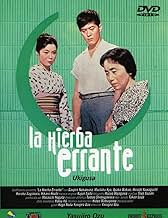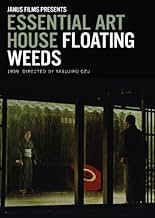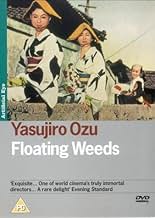AVALIAÇÃO DA IMDb
7,9/10
9,5 mil
SUA AVALIAÇÃO
O chefe de uma trupe de teatro itinerante retorna à cidade litorânea onde deixou um filho que não sabe do verdadeiro parentesco entre eles.O chefe de uma trupe de teatro itinerante retorna à cidade litorânea onde deixou um filho que não sabe do verdadeiro parentesco entre eles.O chefe de uma trupe de teatro itinerante retorna à cidade litorânea onde deixou um filho que não sabe do verdadeiro parentesco entre eles.
- Direção
- Roteiristas
- Artistas
- Direção
- Roteiristas
- Elenco e equipe completos
- Produção, bilheteria e muito mais no IMDbPro
Avaliações em destaque
I wrote this after I saw my first Ozu's film, "Tokyo Story" about a year ago: "As with every great work, the film has its own unique perfection in style, rhythm, details, and artist's vision - but Tokyo Story is very universal in its appeal, simply put, it is for every parent, every son or daughter - for everyone. It was made 50 years ago in Japan, about people who lived far away, but it is also about all of us, our families, our problems, our guilt and our search for love and meaning. Ozu's film does not require one to be a movie buff or to try to solve complex symbolism to appreciate and love it. It brings smiles because it is a comedy (for at least the first 2/3) and sadness with a high drama of the last 1/3 of the film."
I feel absolutely the same about "Floating Weeds". The film is quiet and deceptively simple but its simplicity reminded me the words of Michelangelo Buanorotti. When asked how he created the perfect statues from the shapeless marble lumps, he answered, "It is very simple, you just cut off all unnecessary pieces".
Ozu's films are perfect - they touch us with rare warmth, soft enveloping tenderness and power of human emotions not necessarily with striking visual or sound effects. "Floating Weeds" is a remake of earlier silent black and white Ozu's film "The Story of Floating Weeds". The story is simple: an aging, traveling actor who is the manager of a kabuki troupe returns to a remote village where he secretly meets his former lover and her 19 year old illegitimate son, to whom he is known as "uncle." The older man finds happiness in communicating with his son who turned to be a fine young man. His current mistress, filled with jealousy because of his attachment to his secret family, hires a young beautiful girl, the member of a troupe to seduce a boy. Something in this story attracted Ozu so much that he remade the film twenty five years later.
"Floating Weeds" is a beautiful color film and it is the first color Ozu's film for me. The colors are bright and fresh, tender and kind - they match the director's style perfectly. The delightful music by Kojun Saito reminds me of Nina Rota music in Fellini's films - nostalgic, innocent and rhythmic.
I feel absolutely the same about "Floating Weeds". The film is quiet and deceptively simple but its simplicity reminded me the words of Michelangelo Buanorotti. When asked how he created the perfect statues from the shapeless marble lumps, he answered, "It is very simple, you just cut off all unnecessary pieces".
Ozu's films are perfect - they touch us with rare warmth, soft enveloping tenderness and power of human emotions not necessarily with striking visual or sound effects. "Floating Weeds" is a remake of earlier silent black and white Ozu's film "The Story of Floating Weeds". The story is simple: an aging, traveling actor who is the manager of a kabuki troupe returns to a remote village where he secretly meets his former lover and her 19 year old illegitimate son, to whom he is known as "uncle." The older man finds happiness in communicating with his son who turned to be a fine young man. His current mistress, filled with jealousy because of his attachment to his secret family, hires a young beautiful girl, the member of a troupe to seduce a boy. Something in this story attracted Ozu so much that he remade the film twenty five years later.
"Floating Weeds" is a beautiful color film and it is the first color Ozu's film for me. The colors are bright and fresh, tender and kind - they match the director's style perfectly. The delightful music by Kojun Saito reminds me of Nina Rota music in Fellini's films - nostalgic, innocent and rhythmic.
... aren't we all, their lives steadily unravelling as their audience shrinks, their relationships stretched with secrets, revenge and deception coming to the fore. A poetic observation of life that turns the seemingly ordinary into something quite the opposite and, as relevant today as it has always been, as it encourages you to reflect on who you really are or have been, where you've come from and, more importantly, where you might be going.
This close remake of Yashijuro Ozu's silent 'The Story of Floating Weeds' from 1934 which was made under the aegis of Shochiku studios is a far mellower work which reflects not only its director's maturity but also the cheerier tone preferred by Daiei. He also has the benefit here of utilising Daiei's senior lighting cameraman Kazuo Miyagawa whose colour cinematography is ravishing as well as two of Daiei's leading performers Ganjiro Nakayama and Machiko Kyo as master and mistress Komajuro and Sumiko. The sunnier treatment is heightened by the wistful, nostalgic score by Fakandu Saito which would not be out of place in a Jacques Tati film.
Taking its title from the Japanese name for itinerant actors, this has all the hallmarks of Ozu's oeuvre, in terms of serenity, humanism and a profound understanding of the human heart. As usual the camera is static and placed a little below the actors whilst the compositions are nothing less than painterly. For this viewer at any rate one would have wished a few scenes, notably the confrontation between Komajuro, Oyoshi, Kyoshi and Kayo, to have been a little more animated but that is simply not Ozu's way. The argument between Komajuro and Sumiko whilst sheltering from the rain is masterfully handled as is their final touching scene in the railway station. The splendid images that open and close the film linger long in the memory.
By all accounts Ozu never aimed for an international audience and indeed his films were not really appreciated in the West until the decade after his death. His work is very much one of variations on a theme and as avowed Ozu devoteee Roger Ebert has observed: "To look at any of his films is to glimpse the whole."
Taking its title from the Japanese name for itinerant actors, this has all the hallmarks of Ozu's oeuvre, in terms of serenity, humanism and a profound understanding of the human heart. As usual the camera is static and placed a little below the actors whilst the compositions are nothing less than painterly. For this viewer at any rate one would have wished a few scenes, notably the confrontation between Komajuro, Oyoshi, Kyoshi and Kayo, to have been a little more animated but that is simply not Ozu's way. The argument between Komajuro and Sumiko whilst sheltering from the rain is masterfully handled as is their final touching scene in the railway station. The splendid images that open and close the film linger long in the memory.
By all accounts Ozu never aimed for an international audience and indeed his films were not really appreciated in the West until the decade after his death. His work is very much one of variations on a theme and as avowed Ozu devoteee Roger Ebert has observed: "To look at any of his films is to glimpse the whole."
An itinerant troupe of Kabuki players bring their shows to the small town in which their leader Komajuro (Nakamura Ganjiro II) sired a son (Kiyoshi, Hiroshi Kawaguchi) from whom he has hidden his parentage. This beautifully made film is Yasujiro Ozu's 'remake' of his 1934 silent (A Story of Floating Weeds). Like all of Ozu's films, little happens as his static camera catches vignettes of the various shabby players as they try to hustle up an audience for their dated show, hit on the local girls (in several amusing scenes), and drink. Much of the story is about Komajuro's reconnecting with Oyoshi (Haruko Sugimura), the mother of his son and the jealous reactions of Sumiko, Machiko Kyo, his current mistress. Like all of Ozu's films, the drifting apart of generations is a focus as Komajuro struggles to ensure that Kiyoshi will go to university and not be destined to live the same life as his parents or the members of the troupe. Like the original, the story and the 'feel' is poignant and melancholy (although there are some comical moments, I missed the scenes in the silent version in which the little boy with the errant bladder plays a dog when the troupe is on stage). Watched with English subtitles.
Floating Weeds by Yasujiro Ozu is an exquisitely restrained film about a failing acting troupe that travels to a small town and engenders a conflict of generations in a Japanese family. As the film opens a boat moves slowly into the harbor a Japanese coastal village. A Kabuki troupe arrives and begins to pass out leaflets announcing their opening performance. Sadly the opening crowds are small. Komajuro (Ganjiro Nakamura), the principal actor in the troupe, goes off by himself to visit Oyoshi (Haruko Sugimura), a former lover who runs a Saki bar. She has an adult son, Kiyoshi (Hiroshi Kawaguchi) who Komajuro had fathered many years ago. Komajuro has hidden his identity from the boy because of his shame at being a traveling actor and Kiyoshi only knows of him only as "uncle".
When Sumiko (Machiko Kyo), Komajuro's mistress and leading star, finds out about this relationship she goes into a jealous rage and hires a young actress, Kayo (Ayako Wakao) to seduce Kiyoshi in order to humiliate his father. Kiyoshi, however, falls in love with Kayo. Komajuro disapproves and shows his anger but cannot exert parental authority since he has not told his son the truth about his parentage. As the troupe continues to draw small crowds, Komajuro's inner pain becomes visible and he strikes out physically against Kayo, Sumiko, and Kiyoshi. It is only in the surprising conclusion that he seems to regain some sense of acceptance of his circumstances.
Floating Weeds is a very intimate experience. The camera does not move but remains focused on the characters as they engage in discussions about commonplace events. As in Bresson, the actors show little emotion and speak in a monotone with long silences between questions and answers. The overall effect, however, is not banality but a sense of the natural rhythm of life. Ozu is a loving observer of human nature not a moralist. There are no saints in this film and each character is vulnerable and deeply human. Komajuro has been stripped of his career, his relationship with his son, and his female companions who still beg him for forgiveness. He is alone but he has retained his humanity and we feel only compassion for him. The ending is, in the phrase of Donald Richie, "a kind of resigned sadness, a calm and knowing serenity which maintains despite the uncertainty of life and things of this world". Floating Weeds is a masterful film from a director who truly respects his audience.
When Sumiko (Machiko Kyo), Komajuro's mistress and leading star, finds out about this relationship she goes into a jealous rage and hires a young actress, Kayo (Ayako Wakao) to seduce Kiyoshi in order to humiliate his father. Kiyoshi, however, falls in love with Kayo. Komajuro disapproves and shows his anger but cannot exert parental authority since he has not told his son the truth about his parentage. As the troupe continues to draw small crowds, Komajuro's inner pain becomes visible and he strikes out physically against Kayo, Sumiko, and Kiyoshi. It is only in the surprising conclusion that he seems to regain some sense of acceptance of his circumstances.
Floating Weeds is a very intimate experience. The camera does not move but remains focused on the characters as they engage in discussions about commonplace events. As in Bresson, the actors show little emotion and speak in a monotone with long silences between questions and answers. The overall effect, however, is not banality but a sense of the natural rhythm of life. Ozu is a loving observer of human nature not a moralist. There are no saints in this film and each character is vulnerable and deeply human. Komajuro has been stripped of his career, his relationship with his son, and his female companions who still beg him for forgiveness. He is alone but he has retained his humanity and we feel only compassion for him. The ending is, in the phrase of Donald Richie, "a kind of resigned sadness, a calm and knowing serenity which maintains despite the uncertainty of life and things of this world". Floating Weeds is a masterful film from a director who truly respects his audience.
Você sabia?
- CuriosidadesStated by cinematographer Kazuo Miyagawa about director Yasujirô Ozu: "I'll never forget that, from the first day on, he knew the names of everybody on the set, fifty people in the crew, people he'd never worked with. He'd written their names down, I learned later. But everyone was impressed and became devoted to him. Every single day working on this film was extremely pleasurable and enriching. In each of Ozu's films you can sniff his personality. He was pure, gentle, light-hearted, a fine individual."
- Erros de gravaçãoNear the end, sandals disappear or move around: after Kiyoshi argues with his father, he runs upstairs, first slipping out of his sandals and leaving them at the bottom (center) of the stairs. Moments later, Kayo goes up to him. We see that she, too, removes her sandals at the bottom of the stairs. But Kiyoshi's sandals have now suddenly disappeared: we see only Kayo's sandals at the bottom of the stairs. Moments later, Kiyoshi comes back downstairs to go after his father. He goes to put on his sandals, which have now suddenly reappeared, but in a different location from where he took them off. A moment later, Kayo also comes down the stairs and puts on her sandals, which are approximately where she had removed them and placed them, moments earlier.
- Citações
Komajuro Arashi: You can't help an empty house, when it's empty.
- ConexõesFeatured in Siskel & Ebert Holiday Gift Guide (1989)
- Trilhas sonorasWasurecha iyayo (aka: Don't forget me)
Composed by Yoshikatsu Hoshoda
Sang by the play troupe on a ship
Principais escolhas
Faça login para avaliar e ver a lista de recomendações personalizadas
- How long is Floating Weeds?Fornecido pela Alexa
Detalhes
- Tempo de duração
- 1 h 59 min(119 min)
- Proporção
- 1.37 : 1
Contribua para esta página
Sugerir uma alteração ou adicionar conteúdo ausente


































